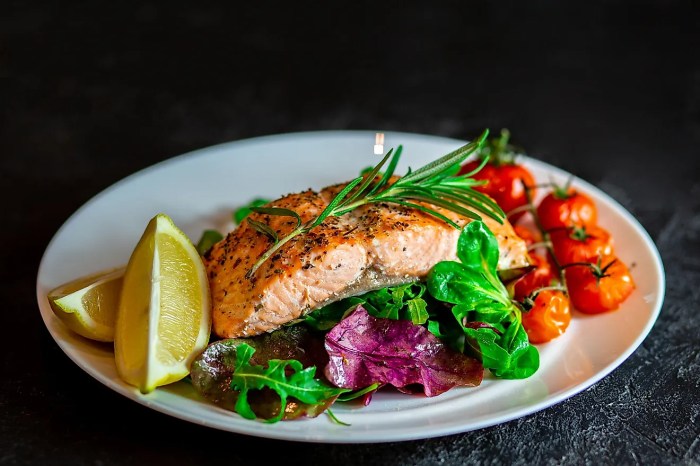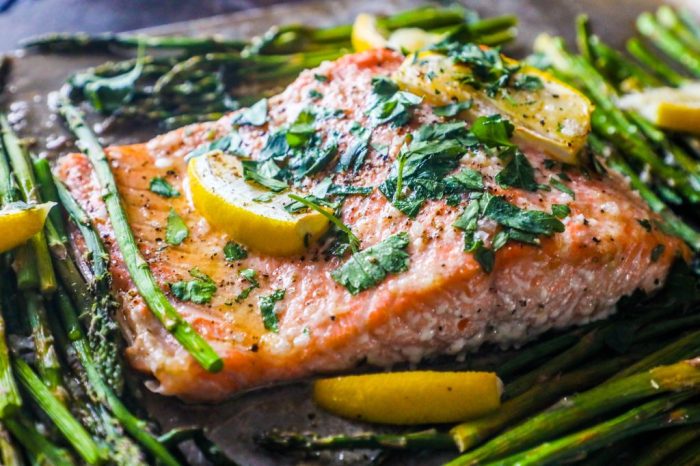Embark on a culinary adventure with pescatarian meals, where the delectable flavors of seafood converge with the principles of a plant-based diet. Dive into a world of vibrant flavors and reap the nutritional benefits that await you.
Pescatarianism, a dietary approach that incorporates seafood while excluding other types of meat, offers a unique balance between ethical considerations and nutritional well-being. Whether you’re seeking to reduce your environmental footprint or enhance your overall health, pescatarian meals provide a gateway to a sustainable and nourishing lifestyle.
Nutritional Benefits of Pescatarian Meals

Pescatarian diets offer a wealth of nutritional advantages due to the inclusion of seafood, which is a rich source of essential nutrients. Fish and shellfish are packed with high-quality protein, omega-3 fatty acids, vitamins, and minerals, making them a valuable addition to a healthy diet.
One of the key benefits of seafood consumption is its high protein content. Fish and shellfish provide complete proteins, meaning they contain all the essential amino acids required for optimal body function. Protein is essential for building and repairing tissues, producing hormones and enzymes, and supporting immune function.
Omega-3 Fatty Acids
Pescatarian diets are also notable for their abundance of omega-3 fatty acids, which are essential for heart health, brain function, and inflammation reduction. Omega-3s have been shown to lower blood pressure, reduce the risk of heart disease, and improve cognitive function.
Fish such as salmon, tuna, and mackerel are excellent sources of these beneficial fatty acids.
Vitamins and Minerals
Seafood is also a rich source of vitamins and minerals, including vitamin D, vitamin B12, selenium, and iodine. Vitamin D is crucial for bone health, while vitamin B12 is essential for red blood cell production and nervous system function. Selenium is a powerful antioxidant that protects cells from damage, and iodine is necessary for thyroid hormone production.
For vegetarians looking to shed a few pounds, it’s essential to prioritize whole, unprocessed plant-based foods. Focus on consuming plenty of fruits, vegetables, legumes, and whole grains. How to diet as a vegetarian can be a nutritious and effective way to lose weight while improving your overall health.
Overall, a pescatarian diet can contribute significantly to overall health and well-being. By incorporating seafood into their meals, individuals can benefit from a wide range of essential nutrients, supporting their cardiovascular health, cognitive function, and overall vitality.
Meal Planning for Pescatarians
Meal planning for pescatarians can be simple and enjoyable with the right approach. By incorporating a variety of seafood into the diet and following a few key tips, pescatarians can ensure they meet their nutritional needs while enjoying delicious and satisfying meals.
Variety of Seafood
Seafood is a rich source of protein, omega-3 fatty acids, and essential vitamins and minerals. To maximize the nutritional benefits of a pescatarian diet, it is important to include a variety of seafood in the diet. This includes fish, shellfish, and crustaceans.
- Fish:Fish is a versatile source of protein and omega-3 fatty acids. Good choices include salmon, tuna, mackerel, and sardines.
- Shellfish:Shellfish are a good source of protein, iron, and zinc. Good choices include shrimp, oysters, mussels, and clams.
- Crustaceans:Crustaceans are a good source of protein, selenium, and vitamin B12. Good choices include lobster, crab, and shrimp.
Sample Meal Plan
Here is a sample meal plan that demonstrates how to meet nutritional needs on a pescatarian diet:
| Meal | Sample Menu |
|---|---|
| Breakfast | Oatmeal with berries and nuts, toast with smoked salmon, or a smoothie with yogurt, fruit, and fish oil |
| Lunch | Grilled salmon salad with mixed greens, vegetables, and quinoa, or a tuna sandwich on whole-wheat bread |
| Dinner | Baked tilapia with roasted vegetables and brown rice, or a shrimp stir-fry with whole-wheat noodles |
| Snacks | Fruit, vegetables, yogurt, or nuts |
Recipes and Cooking Techniques

Indulge in a culinary journey with our enticing collection of pescatarian recipes. From tantalizing appetizers to delectable main courses, we’ve got you covered. We’ll also delve into the diverse cooking methods that bring out the best in seafood, empowering you to create mouthwatering dishes that nourish your body and delight your taste buds.
Selecting and Preparing Sustainable Seafood
When choosing seafood, opt for sustainable options that protect our oceans. Look for fish certified by reputable organizations like the Marine Stewardship Council (MSC) or the Aquaculture Stewardship Council (ASC). To ensure freshness, buy seafood from reputable sources and store it properly.
Clean and prepare your seafood thoroughly before cooking to remove any contaminants.
If you’re looking to shed some pounds while following a vegetarian diet, you’re in luck! With a few simple tips and tricks, you can create a meal plan that’s both healthy and effective. Start by incorporating plenty of fruits, vegetables, and whole grains into your meals.
These nutrient-rich foods will help you feel full and satisfied while providing your body with the essential vitamins and minerals it needs. You can find a comprehensive guide on how to diet as a vegetarian here.
Cooking Methods for Seafood
Explore a range of cooking methods that enhance the unique flavors and textures of seafood. Grilling imparts a smoky, charred taste, while baking produces tender, flaky fish. Steaming preserves the delicate flavors and nutrients of seafood, making it an excellent choice for health-conscious individuals.
Other methods include pan-frying, poaching, and sautéing, each offering its own distinct culinary experience.
Pescatarian Recipes
Embark on a culinary adventure with our curated selection of pescatarian recipes:
- Appetizers:
- Grilled Octopus with Lemon-Herb Marinade
- Crab Cakes with Avocado-Mango Salsa
- Scallop Ceviche with Lime and Cilantro
- Main Courses:
- Baked Salmon with Roasted Vegetables
- Pan-Seared Tuna with Lemon-Caper Sauce
- Seafood Paella with Saffron and Chorizo
Challenges and Considerations: Pescatarian Meals
Adopting a pescatarian diet comes with its unique set of challenges and considerations. Understanding these potential obstacles and developing strategies to overcome them is essential for a successful and fulfilling pescatarian journey.
One of the primary challenges associated with a pescatarian diet is the potential for nutrient deficiencies. Pescatarians may be at risk of not consuming enough of certain nutrients, such as vitamin B12, iron, and omega-3 fatty acids. These nutrients are primarily found in animal products, so pescatarians need to ensure they are obtaining them from other sources.
Supplementation
Supplementation can be a valuable tool for pescatarians to ensure they are meeting their nutrient needs. Vitamin B12 supplements are particularly important, as this nutrient is not readily available in plant-based foods. Iron and omega-3 fatty acid supplements may also be beneficial for some pescatarians, depending on their individual dietary needs.
Dietary Planning, Pescatarian meals
Careful dietary planning is crucial for pescatarians to avoid nutrient deficiencies. Including a variety of nutrient-rich plant-based foods, such as legumes, nuts, seeds, and leafy green vegetables, is essential. Fortified foods, such as plant-based milk and cereals, can also help increase nutrient intake.
Social Situations and Dining Out
Navigating social situations and dining out as a pescatarian can sometimes present challenges. Communicating dietary preferences clearly and politely is important to ensure you are accommodated. Researching restaurant menus in advance and being prepared to make substitutions can help you enjoy dining out while staying true to your dietary choices.
Last Point

As you explore the world of pescatarian meals, remember that variety is key. Incorporate a diverse array of seafood into your diet to maximize your nutrient intake. With careful planning and a touch of culinary creativity, you can create pescatarian meals that are not only delicious but also incredibly beneficial for your health and the planet.
Embrace the pescatarian journey, and discover a world of culinary delights that will nourish your body and soul. Let the flavors of the sea tantalize your taste buds and inspire you to create meals that are both sustainable and satisfying.
FAQ Guide
What are the key nutritional benefits of a pescatarian diet?
Pescatarian meals are rich in omega-3 fatty acids, which support heart health, brain function, and reduce inflammation. They also provide a good source of protein, vitamin D, and iodine, essential for overall well-being.
How can I ensure I’m getting enough protein on a pescatarian diet?
Incorporate a variety of seafood into your meals, including fish, shellfish, and sea vegetables. These foods are excellent sources of protein and provide a range of essential amino acids.
Are there any potential challenges associated with a pescatarian diet?
One potential challenge is ensuring adequate vitamin B12 intake, as this nutrient is primarily found in animal products. Consider supplementing or consuming fortified foods to meet your daily needs.